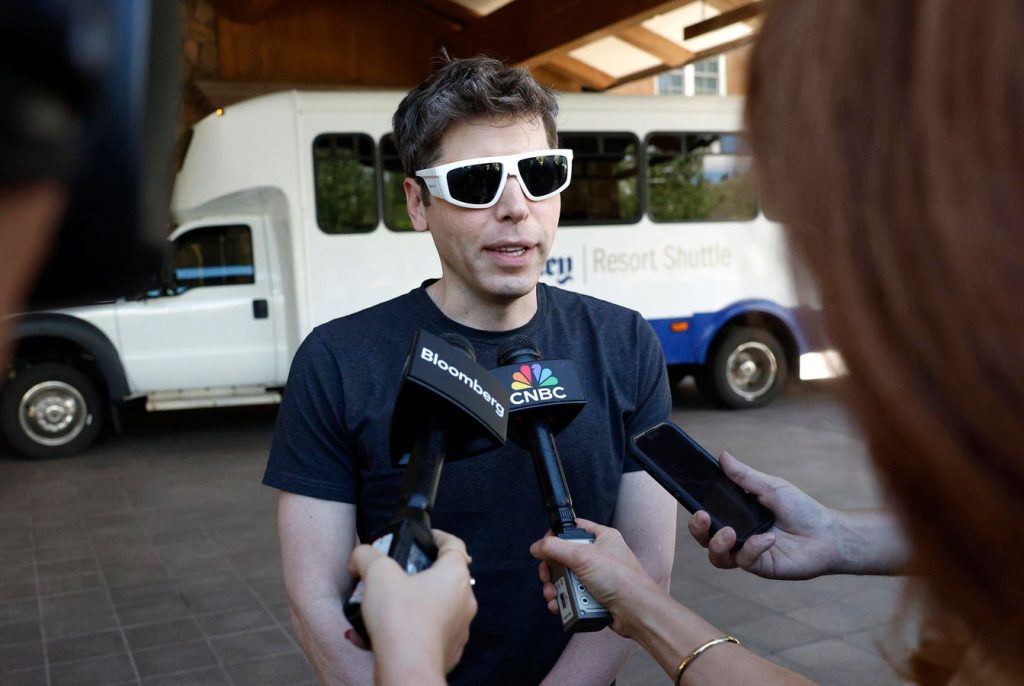SUN VALLEY, IDAHO – JULY 08: CEO of OpenAI Sam Altman speaks to members of the media as he arrives at the Sun Valley lodge for the Allen & Company Sun Valley Conference on July 8, 2025 in Sun Valley, Idaho. Every year, some of the world’s wealthiest and most powerful figures from the media, finance, technology, and political spheres converge at the Sun Valley Resort for the exclusive week-long conference hosted by boutique investment bank Allen & Co.
Getty Images
Will OpenAI Sell Ads, Asks Shelly Palmer. OpenAI is making billions, but still burning cash. Revenue has jumped from $3.7 billion in 2024 to an estimated $12.7 billion this year, yet the company says it won’t break even until 2029. Because only 5% of their users pay for the service, the economics don’t work without advertising, something Sam Altman once dismissed as a “last resort” and “uniquely unsettling.” Ads would close the gap, but at a cost. Shelly Palmer argues they would compromise the very thing that makes ChatGPT valuable: trust. If users believe answers are influenced by sponsors, the app risks losing its core appeal, no matter how many billions it brings in.
HTC has entered the AI eyewear race with the Vive Eagle, a lightweight pair of glasses weighing under 49 grams. Like the Ray-Ban Meta smart glasses, they feature a 12-megapixel camera, open-ear audio, and a discreet design that can pass for everyday eyewear. The Eagle supports both ChatGPT and Google Gemini, offering real-time translation, note-taking, and encrypted local processing. Meta’s version, by contrast, connects users to its own Llama AI. The Eagle launches in Taiwan for about $520, a premium over the Ray-Ban Meta’s $299 entry price, positioning HTC at the high end of smart eyewear.
Andrew Bosworth, chief technology officer of Meta Platforms Inc., during the Meta Connect event in Menlo Park, California, US, on Wednesday, Sept. 25, 2024. Meta Platforms Inc. debuted its first pair of augmented reality glasses, devices that show a combined view of the digital and physical worlds, a key step in Chief Executive Officer Mark Zuckerberg’s goal of one day offering a hands-free alternative to the smartphone. Photographer: David Paul Morris/Bloomberg
© 2024 Bloomberg Finance LP
Meta is expected to launch its first AR display glasses at its Connect event in September. Called Hypernova, the device adds a built-in monocular display in the right lens capable of showing navigation, messages, and other contextual information. Priced at $800, the glasses mark Meta’s most advanced hardware release to date. Hypernova will ship bundled with an sEMG wristband, codenamed Ceres, that reads muscle signals in the wrist to enable discreet gesture controls such as pinching. It runs on a custom Android system paired with the Meta View app.
Calder White, CTO (left), Kole Lee, CEO (center) and Daniel Nunes (right) in the Vigil Palo Alto office
Vigil
Vigil Labs AI Raises $5.7 Million To Build Bionic Traders. Founder and CEO, Kole Lee, dropped out of Stanford to start what may become the world’s largest hedge fund, powered by real time data from proprietary sources, and a reasoning system specifically trained to advise and augment human traders. His first customer is himself. Lee is literally betting his fortune on his startup.
Invisible Universe introduces Invisible Studio.
Invisible Universe
Invisible Universe has opened Invisible Studio, an AI-powered content creation platform for short-form video, to its waitlist of creators. Already used by major media companies, the tool integrates image, voice, and video AI into a modular workflow that takes projects from script to publish-ready content in minutes. Features include a creative assistant trained on short-form trends, automated storyboarding with voice options, and Image2Model, a patent-pending system that generates consistent characters from a single image. A character library and upcoming “Story Lands” expand storytelling options. Invisible Studio, which cut the company’s own production costs by 95%, starts at $10/month.
AiMation, the London-based company behind the AI feature film Where the Robots Grow, has launched Omnigen-01, a platform for long-form AI content production. Designed to unlock the value of dormant scripts, Omnigen-01 turns unproduced projects into what AiMation calls “Professional Generated Content” (PGC)—feature films and series created with AI. The system compresses months of pre-production into hours, integrating leading models while allowing creators to focus on storytelling. Two versions are available: Omnigen Standard, a token-based pay-as-you-go service, and Omnigen Vault, an enterprise tool for studios and agencies. AiMation positions PGC as a new economic lane for the entertainment industry.
This column has a companion, The AI/XR Podcast, hosted by its author, Charlie Fink, and Ted Schilowitz, former studio executive and futurist recently at Paramount and Fox, and Rony Abovitz, founder of Magic Leap. This week our guest is novelist Devon Eriksen, author of the new sci-fi novel Theft of Fire. We can be found on Spotify, iTunes, and YouTube.


